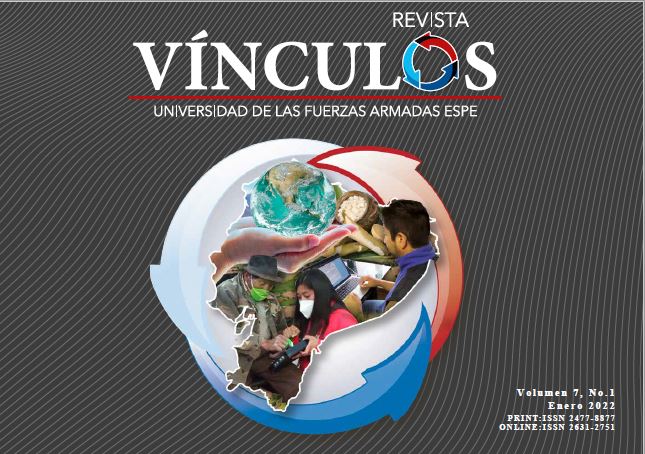Communication Strategies of the food heritage of the Alausí Canton-Ecuador
Main Article Content
Abstract
The Food Heritage of Alausí has been considered for years, as a complementary resource of natural or cultural tourist products, for this reason, the investigation was proposed with the aim of analyzing the main causes of the loss of said gastronomic traditions and, at the same time, develop communication strategies focused on the conservation and dissemination of hereditary knowledge that still persists in the living memory of the population. From a mixed research approach, the methodology used was based on the review of information from bibliographic sources on gastronomy, culture and identity. A field work was carried out, where quantitative data was collected through the application of surveys to the owners / managers of the food and beverage establishments registered in the tourist registry of the Municipal Gad, in order to measure their level of knowledge regarding culinary beliefs and practices. Likewise, several interviews were applied that served as support to collect qualitative information that helped to locate local products, agricultural processes, cooking techniques, traditions and customs in the preparation of traditional local dishes. Based on the results, it was determined that there is little knowledge regarding cultural manifestations, ways of obtaining products and ancestral cooking techniques. In conclusion, Food Heritage is devalued, therefore, the communicational approaches raised constitute a great tool for the development and positioning of the gastronomic sector at a local, national and international level.
Downloads
Article Details

This work is licensed under a Creative Commons Attribution-NonCommercial-ShareAlike 4.0 International License.
Los autores que publican en esta revista están de acuerdo con los siguientes términos:
- Los autores conservan los derechos de autor y garantizan a la revista el derecho de ser la primera publicación del trabajo al igual que licenciado bajo una Creative Commons Attribution License que permite a otros compartir el trabajo con un reconocimiento de la autoría del trabajo y la publicación inicial en esta revista.
- Los autores pueden establecer por separado acuerdos adicionales para la distribución no exclusiva de la versión de la obra publicada en la revista (por ejemplo, situarlo en un repositorio institucional o publicarlo en un libro), con un reconocimiento de su publicación inicial en esta revista.
- Se permite y se anima a los autores a difundir sus trabajos electrónicamente (por ejemplo, en repositorios institucionales o en su propio sitio web) antes y durante el proceso de envío, ya que puede dar lugar a intercambios productivos, así como a una citación más temprana y mayor de los trabajos publicados.
How to Cite
References
Bonilla, E., & Rodríguez, P. (2000). Más allá de los dilemas de los métodos. La investigación de las ciencias sociales. Bogotá: Grupo Editorial Norma. https://laboratoriociudadut.files.wordpress.com/2018/05/mas-alla-del-dilema-de-losmetodos.pdf
Contreras, Luco, & Ríos. (2019). Patrimonio culinario: propuesta para una metodología de distinción patrimonial de las culinarias locales. Revista Ciencias y Humanidades, 8(8), 163-181. https://revistacienciasyhumanidades.com/index.php/home/article/view/78
Fernández, M. (2012). Temas Dirección de Marketing. España: Cadiz. https://rodin.uca.es/xmlui/bitstream/handle/10498/14887/libro-dir-mk-en-espa%C3%B1ol.pdf?sequence=1
Ferrell, O., & Hartline, M. (2012). Estrategia de marketing. México: Cengage Learning Editores, S.A. de C.V.
González, F. (2014). Mercadotecnia estratégica: teoría e impacto en las unidades de información. México: Creative
Commons. http://ru.iibi.unam.mx/jspui/bitstream/IIBI_UNAM/L117/1/mercadotecnia_estrategica_ui.pdf
Hernández Sampieri, R., & Mendoza, C. (2008). El matrimonio cuantitativo cualitativo: el paradigma mixto. In J. L. Álvarez Gayou (Presidente), 6º Congreso de Investigación en Sexología.
Hernández, R., & Dancausa, M. (2018). Turismo Gastronómico: La gastronomía tradicional de Córdoba (España). Estudios y perspectivas en turismo, 27(2), 413-430.
Martínez, A., Ruiz, C., & Escrivá, J. (2014). Marketing en la actividad comercial. España: McGraw-Hill/Interamericana
de España, S.L. https://www.mheducation.es/bcv/guide/capitulo/844819358X.pdf
Medina, X. (2017). Reflexiones sobre el patrimonio y la alimentación desde las perspectivas cultural y turística.
Anales de antropología, 51(2), 106-113. https://doi.org/10.1016/j.antro.2017.02.001
Monferrer, D. (2013). Fundamentos del Marketing. Universitat Jaume I.
Montenegro. (2019). Patrimonio y Alimentación: miradas “otras”. Difusiones, 17(17), 51-60. http://revistadifusiones.net/index.php/difusiones/article/view/213
Navarrete, M., & Muñoz, C. (2018). Turismo gastronómico: sabor y tradición. Journal of Tourism and Heritage
Research, 1(3), 23-40. https://dialnet.unirioja.es/servlet/articulo?codigo=7400807
Ramírez, F., & Zwerg, A. (2012). Metodología de la Investigación: más que una receta. AD-minister(20), 91-111. https://publicaciones.eafit.edu.co/index.php/administer/article/view/1344

